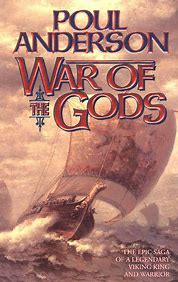For a kick-off, Hadding needs considerable time to recuperate from the wounds inflicted by his adversary. He is not a comic-book hero, to quote the narrator of Anderson's Operation Luna.
When Hadding's men arrive to carry him away, two ravens fly off. In other words, Odin has spied on the proceedings. Whether appropriately or coincidentally, a raven is the emblem on Hadding's banner and is woven on the colored sail of his ship. He ensures that it shows broadside on when he enters the harbor.
The archer god Ullr named on page 128 (I assume that "Ull the Hunter" and the Ullr the archer are the same deity) appears later. Visiting the underworld, Hadding sees a pantheon of seven big, handsome well-dressed men:
one holds a spear (Odin);
one grips a hammer (Thor);
one wears a sword but lacks a hand (Tyr);
one holds a sickle (Freyr?);
one has a bow and quiver (Ullr);
one clasps a harp (Bragi);
one is white and has a horn (Heimdall).
(Seven implements: four weapons; two tools; one musical instrument.)
I am not sure to what extent Anderson merely reproduces from his sources Hadding's strange experiences with an unknown beast, then later in the underworld? The latter include a bizarre vision of Resurrection. Please read it. I prefer not to summarize.
I think that, somewhere in Wagner, Siegfried addresses the Wanderer contemptuously as "...old gangrel..."? (Which fits with "Gangleri" meaning "Wanderer.")
As ever in Anderson's works, some passages stand out for beauty of language. For example:
"Overhead circled the gulls. The light burned gold on their lean white wings." (p. 91)

No comments:
Post a Comment